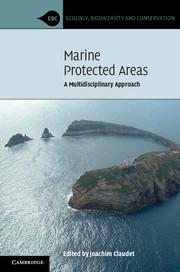Book contents
- Frontmatter
- Contents
- Contributors
- Introduction
- Part I Threats to marine ecosystems and resources
- 1 MANAGEMENT – Transitioning from single-sector management to ecosystem-based management: what can marine protected areas offer?
- Part II Effects of marine protected areas
- Part III Assessment of the effectiveness of marine protected areas
- Part IV Scale-up of marine protected area systems
- Index
- References
1 - MANAGEMENT – Transitioning from single-sector management to ecosystem-based management: what can marine protected areas offer?
from Part I - Threats to marine ecosystems and resources
Published online by Cambridge University Press: 05 August 2012
- Frontmatter
- Contents
- Contributors
- Introduction
- Part I Threats to marine ecosystems and resources
- 1 MANAGEMENT – Transitioning from single-sector management to ecosystem-based management: what can marine protected areas offer?
- Part II Effects of marine protected areas
- Part III Assessment of the effectiveness of marine protected areas
- Part IV Scale-up of marine protected area systems
- Index
- References
Summary
Introduction
Over the past 30 years, as coastal areas have been severely affected by a wide variety of human activities, traditional resource management has failed to prevent overexploitation and habitat degradation (Lauck et al., 1998; Claudet et al., 2006; Crowder et al., 2008). Ecosystem-based management (EBM) is a relatively new approach, and it is considered a promising solution to maintain ecosystem structure and function (Ruckelshaus et al., 2008). It represents an evolution from traditional management of single threats along single portions of ecosystems to large-scale management strategies within complex natural and socio-economic systems (Tallis et al., 2010). The aim of EBM is to sustain the long-term capacity of marine ecosystems to deliver the goods and services that society enjoys (e.g., seafood, clean water, protection from coastal erosion) while at the same time addressing the inherent trade-offs required to meet multiple management goals (Halpern et al., 2010). The consideration of human uses of and interactions with natural resources in EBM approaches improves the likelihood of achieving desired ecosystem outcomes (Gallagher et al., 2004). In 2005, McLeod et al. made a large contribution to defining EBM, but such efforts can still be considered as only the early stages of implementation and evaluation. The scientific community does not always agree about the principles that should inspire the management, conservation, and monitoring of marine environments (Worm et al., 2006; Bulleri et al., 2007; Hilborn, 2007; Stewart-Oaten, 2008; Lindenmayer and Likens, 2009). Although the importance of an ecosystem approach is widely accepted, its implementation is challenging in part due to perceptions that it is too complicated and has prohibitive information requirements (Tallis et al., 2010) and in part because it is ill-defined (Lotze, 2004). Scientific advice on the status of biodiversity and fish stocks, the effects of fishing and the role of marine protected areas (MPAs) are only small components in a complex management and decision-making process, in which scientific information often carries little weight in relation to immediate social and economic considerations (Jennings, 2004). Given the current worldwide biodiversity decline, there is an urgent need for immediate reassessment of present conservation strategies to develop initiatives aimed at reversing present trajectories of ecological degradation in the ocean.
- Type
- Chapter
- Information
- Marine Protected AreasA Multidisciplinary Approach, pp. 11 - 34Publisher: Cambridge University PressPrint publication year: 2011
References
- 10
- Cited by

